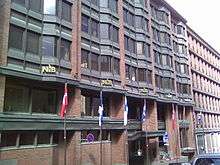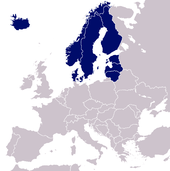Nordic Investment Bank
The Nordic Investment Bank (NIB) is an international financial institution founded in the mid-1970s by the five Nordic countries: Denmark (incl. Faroe Islands, Greenland), Finland (incl. Åland Islands), Iceland, Norway and Sweden. In 2005, Estonia, Latvia and Lithuania became members of the Bank. NIB’s headquarters are located in Helsinki, Finland. NIB acquires the funds for its lending by borrowing on the international capital markets.

 | |
 NIB member states, as of 2005 | |
| Abbreviation | NIB |
|---|---|
| Type | International financial institution |
| Headquarters | Helsinki, Finland |
Membership | |
President | Henrik Normann |
Parent organization | Nordic Finance Group |
| Website | www |
Strategy
NIB provides loans and guarantees to private and public limited companies, governments, municipalities and financial institutions. Its main lending areas are:
- energy & water
- infrastructure, transport & telecom
- industries & services
- financial institutions & small and medium-sized enterprises
NIB has a significant environmental loan portfolio outside its member countries, including the Baltic Sea and Barents regions. The bank acquires the funds for its lending by borrowing on international capital markets. NIB's bonds have the highest possible credit rating, AAA/Aaa, with the rating agencies Standard & Poor’s and Moody’s.
The bank's mission is to finance projects that improve the productivity and benefit the environment of the Nordic and Baltic countries.
Structure and management
Each member country designates a Governor to the Bank's Board of Governors, which is the supreme decision-making body. The Control Committee is the Bank's supervisory body. The Board of Directors makes policy decisions concerning the operations and approves the financial transactions proposed by NIB's President. NIB's President is responsible for the conduct of the current operations of the Bank. The President is assisted in his or her work by the Executive Committee, Asset and Liability Committee, Credit Committee, Finance Committee and ICT Council.
The Bank has some 200 employees from all the member countries. NIB has its headquarters in Helsinki, Finland. The Bank's official language is English.
NIB promotes transparency, predictability, accountability, responsibility and disclosure as general principles enhancing and furthering good governance.
Legal framework
NIB is governed by its constituent documents, namely the Agreement among its member countries and the Statutes, as well as the Headquarters Agreement concluded between NIB and the Government of Finland. These establish that NIB is the member countries' common international financial institution, having the same status as other legal persons conducting similar operations within and outside the member countries. Furthermore, the constituent documents stipulate that NIB has the status of an international legal person with full legal capacity, define the immunities and privileges of the Bank and its personnel and set out the structure for the governance of the Bank.
Cooperation
NIB places great importance on its cooperation with other financing institutions. The Bank's aim is to create added value for its customers by supplementing other sources of finance with long-term loans and guarantees. NIB cooperates and cofinances projects with other international financial institutions and regional multilateral banks as well as with public and private sector lenders such as export credit institutions, development cooperation authorities and commercial banks. NIB belongs to the Nordic Finance Group consisting of four international financial institutions located together in Helsinki, Finland. NIB channels its financing to small and medium-sized enterprises through local intermediaries.
NIB participates actively in the Northern Dimension Environmental Partnership (NDEP). As regards environmental cooperation, NIB has also signed the declaration European principles of the environment together with four other European international financial institutions. NIB hosts the Secretariat of the Northern Dimension Partnership on Transport and Logistics (NDPTL) established in 2009.
NIB has established cooperation with international financial institutions such as the Asian Development Bank (ADB); the African Development Bank (AfDB); the Council of Europe Development Bank (CEB); the European Bank for Reconstruction and Development (EBRD); the Inter-American Development Bank (IDB); as well as the IBRD, IDA, and IFC within the World Bank Group. Furthermore, NIB has cooperation agreements with three regional multilateral banks: the Black Sea Trade & Development Bank, the Central American Bank for Economic Integration CABEI and the Andean Development Corporation CAF. Through these institutions, NIB can operate also in countries where it has no agreement on financial cooperation.
NIB established financial cooperation with the Republic of Kazakhstan in October 2018. Under the cooperation agreement, NIB can fund investment projects in the country.[1]
Nordic Finance Group
NIB is part of the Nordic Finance Group, consisting of four international financial institutions located in the same block in Helsinki, Finland. The institutions within the group offer different types of financing and competences. In addition to NIB, the following institutions belong to the group:
- Nordic Development Fund (NDF)
NDF is a multilateral development finance organisation, providing grant financing for climate projects in poor developing countries.
- Nordic Environment Finance Corporation (NEFCO)
NEFCO is a risk capital institution financing environmental projects in Central and Eastern Europe.
- Nordic Project Fund (Nopef)
Nopef is an organisation that works to strengthen the international competitiveness of small and medium-sized enterprises by providing loans on favourable terms for cofinancing feasibility studies.
NDF, NEFCO and Nopef are owned by the five Nordic countries.